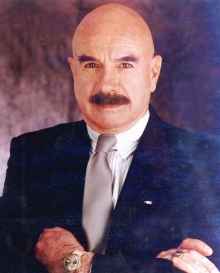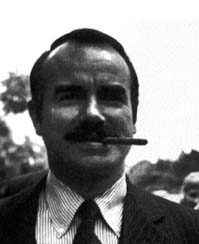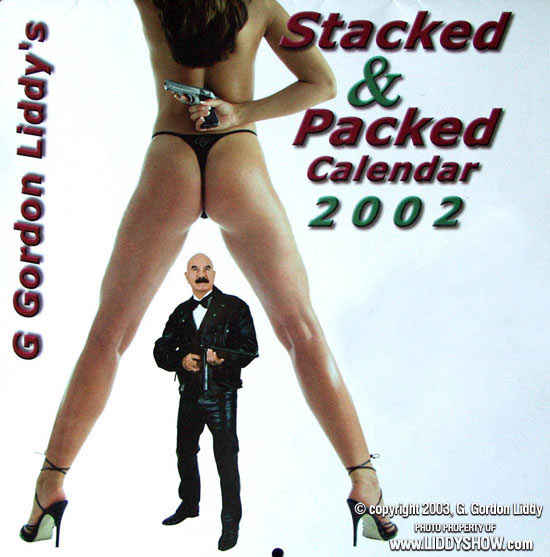|
G. Gordon Liddy The G, surprisingly, doesn't stand for "goon," "ghoul" or "gestapo." It stands for "George." However, G. Gordon Liddy's second middle name is "Battle," which has to count for something.
The G, surprisingly, doesn't stand for "goon," "ghoul" or "gestapo." It stands for "George." However, G. Gordon Liddy's second middle name is "Battle," which has to count for something. There are two ways you can look at Liddy: He might be a curious study in grand megalomania coupled with apparently only mediocre ability. Or he could be a nefarious power-mongering secret agent whose life is filled with intrigue, secrets which could shake the nation and tales of high adventure. We'll let you guess which version of the story Liddy himself prefers. After two years in Korea, Liddy got his law degree and went to work for J. Edgar Hoover at the FBI. Liddy arrived during the glory days of Hoover's reign, while the agency was tracking down gangsters left and right, but before it started assassinating civil rights leaders. According to Liddy's own accounts (which vary considerably from day to day), his jobs at the FBI included monitoring possible candidates for internment at secret concentration camps, tracking down America's Most Wanted and raiding the home of recreational drug guru Timothy Leary in a fruitless search for something that would stand up in court (in light of the drug laws at the time). In 1962, Liddy left the FBI for a short-lived career as a lawyer, first in private practice and later as a prosecutor in New York State. He continued his weird lifelong fixation with Leary, raiding his home in the area in an attempt to nail him on drug charges. Liddy's prosecution eventually led the U.S. Supreme Court to overturn the existing drug laws of the day as unconstitutional (prompting Congress to write a whole new set of even more Draconian laws). As a minor politico in New York, Liddy naturally caught the attention of Richard M. Nixon's 1968 presidential campaign, which was looking for unpaid help, as all campaigns do. As a reward for a job well done, Liddy was brought into the Nixon administration, as a lawyer in the Treasury Department. In 1971, Liddy was promoted to the White House Staff, and that's when the trouble began. After (in his own mind) creating the Drug Enforcement Agency, he moved on to bigger and better things a job with the White House "Special Investigations Group." Organized by Egil "Bud" Krogh, the man who brought Liddy on board, the group was informally known as "the Plumbers," because their job was to stop leaks from the executive branch. The prima facie justification for this was "national security," but the Plumbers quickly expanded their role into political security as well.
Liddy left the White House to join the aptly named Committee to Re-Elect the President (CREEP) in 1972, but he remained an integral part of the Nixon administration's secret operational team. In early 1972, Liddy presented Nixon's attorney general, John Mitchell, with an action plan called "Operation Gemstone." Gemstone laid out a $1 million budget for black ops activity against the president's political enemies, including covert schemes to manipulate Howard Hughes and Aristotle Onassis and a proposal to kidnap dissidents who might protest at the Republican National Convention later that year. Mitchell nixed the plan because it cost too much, rather than because it was illegal, immoral, impractical or just plain insane. But he was impressed with Liddy's gumption, and gave the former FBI agent at least $250,000 to launch a scaled-down version of the plan, which included a break-in at the Democratic Party headquarters at the Watergate hotel. The ultraparanoid Liddy was an ideal choice for this sort of operation. When the burglars were caught, Liddy sprang into action, shredding papers and even money he had been given by the Nixon campaign, and preparing himself for the inevitable stint in prison. As the scandal slowly unfolded, Liddy was a rock. Questions of sanity and morality aside, if all of Nixon's men had been like Liddy, there would have been no Watergate. Liddy's world view is probably best explained by some of the colorful anecdotes he likes to share. At parties, Liddy was known to hold his hand over a candle flame until it burned, in order to demonstrate the merits of willpower, explaining that "the trick is not to mind the pain." Liddy was once afflicted with a fear of rats, so he caught, cooked and ate a rat, just to get over it.
Although no one took him up on this offer, Liddy never budged and never disclosed any incriminating information until long after it was all over. Eventually, he was convicted of conspiracy and served more than four years in prison, more than any other member of the Nixon administration. His 20-year sentence was eventually commuted by Jimmy Carter, more or less on the grounds that no one else was doing that kind of time, so there wasn't much point in singling Liddy out. In 1980, Liddy published his autobiography, "Will," in which he recounted stories such as the rat and Leary things, and recounting his early admiration for Hitler (a sentiment he shared with a certain governor of California), but the book failed to shed a lot of new light on his Watergate role. After a few years exploiting his notoriety for TV game show appearances and guest starring roles on programs like "Miami Vice," Liddy took the perhaps inevitable career course laid out before him, and became a syndicated radio talk show host, where he famously dished out advice to would-be nut jobs seeking to protect their constitutional rights. The most infamous of these incidents was a 1994 show in which he advised a caller worried about jack-booted ATF agents kicking in his door: "They've got a big target on there: ATF. Don't shoot at that because they've got a vest on underneath that. Head shot, head shots." He also suggested that groin shots were a good backup plan. In recent years, Liddy has said as much as he ever had about Watergate, throwing his support behind a conspiracy theory that the DNC break-in was ordered by White House Counsel John Dean, who wanted to cover up his future wife's alleged connection to a Washington, D.C., call-girl ring. Liddy's support of this theory has gotten him sued by the Democratic official whose phone was being bugged in the break-in. The case was dismissed after the jury couldn't reach a verdict. During the trial, Liddy was asked if he had ever considered killing Dean. He responded, "I wouldn't consider him worth the quarter it would cost to buy the cartridge that would propel the bullet to kill him with." Dean sued Liddy for libel, but the case was dismissed. The publisher of the book first proposing the call girl theory settled a similar suit by Dean and his wife for an unknown amount of money. In his later years, Liddy reunited with the man who had inexplicably become his friend, Timothy Leary, for a touring debate on the merits of drugs, while advancing such entrepreneurial concepts as the "Stacked and Packed" calendar, in which buxom and scantily clad women pose with firearms in order to make some kind of statement about constitutional rights, making major bucks as a lecturer and penning books on politics, such as his most recent libertarian tome, "When I Was A Kid, This Was A Free Country." Although he's now well into his 70s, you couldn't tell from looking at him. Liddy credits this suspiciously Faustian longevity to some "scientifically formulated" amino acid supplement that he shills from his Web site, dangling the prospect we could be receiving his thoughtful political insights and his helpful tips on killing federal law enforcement agents for years to come. If the prospect makes you a little uncomfortable, just remember, the trick is not to mind the pain...
Timeline
|
 Later in 1971, the Plumbers broke into the office of a psychiatrist who had been treating prominent anti-war activist Daniel Ellsberg, a former Defense Department analyst who had leaked papers dramatically undercutting public support for the
Later in 1971, the Plumbers broke into the office of a psychiatrist who had been treating prominent anti-war activist Daniel Ellsberg, a former Defense Department analyst who had leaked papers dramatically undercutting public support for the  The White House was a bit freaked out by such stories and other evidence of Liddy's extreme fanaticism. At one point, he reputedly sent the administration a message that he would happily stand on a street corner and wait to be assassinated, if they thought that would help.
The White House was a bit freaked out by such stories and other evidence of Liddy's extreme fanaticism. At one point, he reputedly sent the administration a message that he would happily stand on a street corner and wait to be assassinated, if they thought that would help.